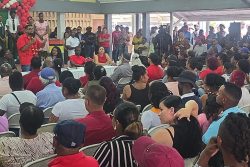Sometimes in life we are in the middle of a major social transition on a national scale, but the intensity of the movement and the frenzy of it can often reach such a pitch that we are not able to see past the furor and recognize, at a deeper level, the fundamental alteration that is taking place. One such for me was living in North America in the latter stages of the US involvement in the Vietnam War and witnessing the intense anti-war protests on college campuses and streets where clashes and arrests were a routine matter. Very few of us, caught up in our own concerns, were able to recognize that back of the protests, away from the streets, American public opinion, in the mass sense, had shifted from a benign attitude toward the war to concerted opposition. Only after the demise of Lyndon Johnson were we able to see what had happened in America despite their President’s determination that the war should go on.
Witnessing the frenzy that is accompanying our upcoming election here, it is possible that we may well be in a fundamental transition in Guyana that is not yet obvious to us. One example is the upsurge in commentaries on the subject of racial voting which has dominated our politics since independence. In many of the writings, from both established advocates and ordinary citizens, what is being conveyed is that many Guyanese are recognizing the impediments in such an approach in a country with two dominant ethnic groups, and are openly calling for an end to it. Over the years, there have been some specific voices, in both public and private life, decrying this position and citing it as a critical factor in the contentious, even antagonistic, attitudes in our political life and in the rigidity of successive governments, but in recent months those few voices have become a virtual flood as civil activists, political candidates and private letter writers in the media are raising the shout for an end to racial voting. With the election votes yet to be counted one cannot be sure, but it could be that we are witnessing the stirrings of a transition in this country fuelled, some are arguing, by the large number of young voters now having a say in the election and being able to influence the more senior members among their families and friends toward this pivotal change of direction.
 Another possible alteration in the offing can be seen in the questions about “winner takes all” politics that characterizes our system. More and more voices are stressing that in a country with two dominant ethnic groupings such as Guyana, our present system leaves almost half of the citizens of the country at the back of the bus with their only hope a possible turnaround at the next election. This “marginalization”, as it is deemed, with the potential to affect whichever group loses, is now being recognized as a defect that needs to remedied, by constitutional reform and other means, and while some of the comments may be political posturing their frequency and expressed urgency in recent times suggests that another shift may be bubbling. Undoubtedly, today’s citizens, better informed about world affairs than ever, are clearly aware of the violent reactions we are seeing right now erupting in societies where this political exclusion, based on various measures, takes place.
Another possible alteration in the offing can be seen in the questions about “winner takes all” politics that characterizes our system. More and more voices are stressing that in a country with two dominant ethnic groupings such as Guyana, our present system leaves almost half of the citizens of the country at the back of the bus with their only hope a possible turnaround at the next election. This “marginalization”, as it is deemed, with the potential to affect whichever group loses, is now being recognized as a defect that needs to remedied, by constitutional reform and other means, and while some of the comments may be political posturing their frequency and expressed urgency in recent times suggests that another shift may be bubbling. Undoubtedly, today’s citizens, better informed about world affairs than ever, are clearly aware of the violent reactions we are seeing right now erupting in societies where this political exclusion, based on various measures, takes place.
It is worth noting that the debate has moved from the purely political to the more social aspects that flow from it, so that we are now seeing a vigorous debate engaging the matter of “who we are”, and although there are differing voices, we are hearing more and more Guyanese, both here and abroad, stoutly proclaiming to seeing themselves as “Guyanese” first and foremost without abandoning their cultural ancestors. It is a point that has strong resonance for the many citizens of Guyana who historically have roots in other countries (Portugal; China; Brazil; Britain; etc.), and for its many Amerindians, as well, who have avidly joined the “Guyanese first” brigade. If there is indeed such an identity shift occurring here, those groups, albeit not a dominant number, will probably be at the front of the parade waving their Golden Arrows. The debate is certainly on, and as the election approaches the frequency and the urgency is noticeably higher. As one recent letter writer to Stabroek News put it, “Too much is at stake. This election transcends the narrow confines of race and culture.”
It is, of course, possible that what we are witnessing here may be largely rhetorical, driven by the infinitely more accessible means of communication we enjoy these days, and by the stronger role of the media. Also, as political observers in diverse domains have noted over the years, what persons indicate they will do in an election is often quite at variance with how they actually mark the ballot paper on the crucial day. So it may be that the ingrained disposition to racial voting will prevail; that people will bow to their cultural ties before any other; that the addiction to “us and them” politics will remain. It could also be, however, that we are watching a transition unfurling in Guyana. Shortly after Monday May 11, we will know which it is.








